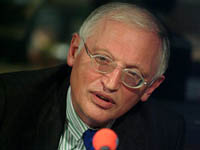EU-Russian ecomonic relations to be eased with Russia's membership in WTO

When Russia becomes the member of the World Trade Organization barriers holding up a broad partnership agreement between Moscow and the European Union will be defeated, officials said Thursday.
EU Industry and Enterprise Commissioner Guenter Verheugen said Russia's adoption of WTO rules and standards would be "an important first step" toward bringing Russia and the EU closer. Russia is the last major world economy outside the WTO.
"It is quite frankly disappointing that Russia is still outside the WTO," Verheugen told a meeting of Russian and EU businessmen and officials.
Delays in reaching agreement on a planned EU-Russia trade deal were a central topic at a summit Friday in Portugal between Russian President Vladimir Putin and senior EU officials.
Verheugen expressed concern that upcoming elections in Russia could encourage some candidates to propose protectionist trade policies to win votes.
Putin said recently that Russia would join the WTO only when the conditions suit it. He said maintaining agricultural subsidies was one of Moscow's demands, even though many countries, such as the EU, are deregulating agricultural markets.
Russian Economics Minister Elvira Nabiullina acknowledged the absence of a WTO agreement was hurting business.
"Discussions (with the WTO) have become bogged down a little, and the more they are delayed the greater the losses for Russian and EU projects and the potential gains missed," she said.
"We are willing to move forward actively, and there is a chance to conclude the negotiations in the near future," she said.
The 27-nation EU is Russia's main trading partner, while Russia is the EU's third most important, after the U.S. and China. Bilateral trade amounts to more than US$300 billion (Ђ210 billion) annually.
Differences over energy sector rules have been a major stumbling block to an EU-Russia agreement.
The EU is the largest consumer of Russian energy products. Russia provides 27 percent of the bloc's imported oil and 44 percent of its imported gas.
Some EU countries endured temporary supply disruptions after Russia in recent years raised the price of gas for Ukraine and duties levied on oil exports to Belarus.
EU officials say Moscow is reluctant to sign the partnership agreement because it would entail granting foreign investors and operators access to Russian oil and gas sectors currently controlled by state-run monopolies.
The EU is preparing new rules designed to ensure that energy prices in the bloc are driven down by competition and to guarantee security of supply. It has threatened to ban foreigners from its markets unless they follow free market principles and join European businesses in separating their supply operations from infrastructure such as pipelines and power grids.
EU Energy Commissioner Andris Piebalgs tried to allay Moscow's fears about the new rules, saying: "There is no discriminatory legislation" against foreign companies.
However, he insisted the EU aimed to prevent domination by powerful energy companies that could hold the market hostage.
Russian Energy Minister Viktor Khristenko warned that shutting out Russian interests "would bring a sharp decrease in energy security."
Subscribe to Pravda.Ru Telegram channel, Facebook, RSS!


